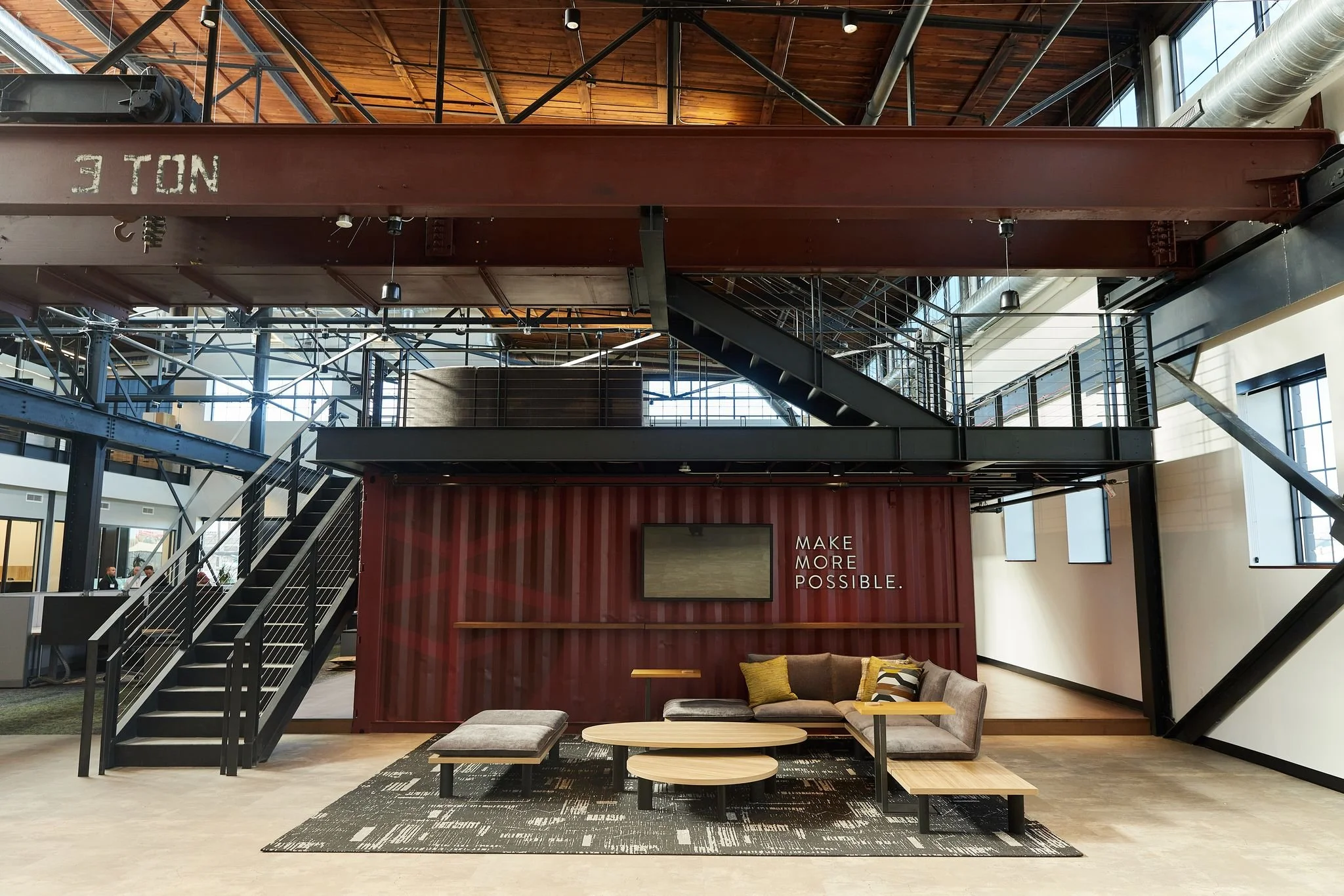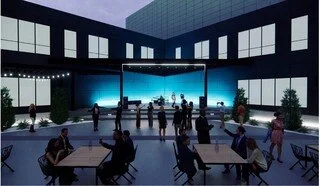Photo credit: MWM STL/Lisa Shackelford
Three major projects shaping 'Mid-County Renaissance' in St. Louis
The Jewel Apartments debut in O'Fallon, Swansea
Lawrence Group adds Integrate Construction Partners, names president
Lawrence Group has announced the spinoff of its construction division into a separate entity, now known as Integrate Construction Partners.
The new commercial construction company offers design-build, construction management and general contracting services. Lawrence Group will continue to provide its core design services including architecture and interior design through its three offices nationwide.
Lawrence Group, which has had a construction division since 2004, has seen its construction division grow substantially through client relationships and its own affiliated real estate projects.
“The market for how organizations seek to facilitate their building needs continues to evolve. The establishment of Integrate Construction Partners creates a more independent platform for providing construction services while allowing our design practice to solely focus on industry-leading design solutions,” said Steve Smith, CEO of Lawrence Group.
Scott Zola has been named president of Integrate Construction Partners; Smith will serve as its chairman.
“I am excited to build upon the success of our construction group through Integrate Construction Partners. Honesty and transparency coupled with first-in-class full life cycle project leadership is the cornerstone upon which Integrate is built. Through a true partnership, we will work with all our project stakeholders to integrate value, safety, quality, community and fun,” said Zola.
Zola joined Lawrence Group in 2014 to lead the firm’s construction practice. Since then, he has grown the firm’s construction volume from approximately $5 million of St. Louis based work to more than $40 million across multiple states with plans for continued growth.
The spinoff, and recent announcement of real estate affiliate New + Found, is part of the organization’s overall strategic plan to build a multidisciplinary group of companies to provide comprehensive building solutions.
Upscale multifamily development receives zoning and site plan approval
Four CRE associations install new officers for 2022
Green Street expands into new city headquarters
STL Region positioned to aid in ongoing supply chain crisis
2022 outlook exceeds pre-pandemic rate
City Foundry STL moves forward with next phase
Construction with a repurpose: Transforming vacant retail spaces
RemigerDesign's talent carries office through pandemic
Pioneer and advocate for DEI receives lifetime achievement award
Kaven Swan, senior principal, firm-wide director of business development-aviation + transportation at the St. Louis headquarters of the global design, architecture, engineering and planning firm HOK, recently received a lifetime achievement award for his work in diversity, equity and inclusion (DEI) in architecture, engineering and construction (AEC) from MOKAN, an advocacy group for minority- and women-owned businesses (MBEs and WBEs).
Swan talked to MetroWire Media about his work and why DEI will continue to be important to those areas of business.
“I gravitated to this work because I started twice with minority-owned firms and saw how difficult it was to get opportunities and assignments and show our skillsets, even though we all went to the same schools,” Swan recalled. “We were in the same building as HOK, and I realized the best way I could lead projects was through a large majority firm.”
Working together created a good team, Swan said. “I found myself becoming an advocate for inclusion and was asked to take a state role (with the Minority Contractors Association), which I did for 10 years. I saw that we have to be intentional in scoring qualifications for projects and making inclusion part of that process.”
When he became a consultant to HOK on the firm’s aviation work in various cities, leveraging relationships was essential to success.
“This business is relationship-based. It became a natural thing to do in all projects,” Swan said. “It was important to have people at the table to become sensitive to factors in decisions.”
Swan made a point of visiting minority firms throughout the region, connecting people and encouraging joint ventures. He believes in the meritocracy of ideas and having a focus on solving problems, often through creative approaches. Although progress has been made, Swan admits challenges still remain.
“There are generational gaps, and it’s still hard for women and minorities to get into architecture school,” Swan noted. “People gravitate to those they know and who look like them.”
A bout with COVID-19 earlier this year has put Swan “in a different place” and led him to reflect on his work and contributions.
“Inclusion is imperative — it’s almost a moral imperative — because our industry is a reflection of our community, the people we serve and the environments we build,” he said. “They are permanent. To get it right, we have to have a diverse perspective. Communities are becoming more diverse, so business has to do the same.”
There have been advances, Swan said. “There is an expectation now that women and minorities will have a seat at the table. That has changed, and will continue to change.”
Swan has been with HOK since 2002, but his impact on DEI extends beyond the firm. In 2015, he worked with BJC Healthcare to develop a framework for improving diversity and inclusion in the institution’s contracting. He is a member of the Diversity Committees of the Airport Council International-North America and the American Association of Airport Executives; on the Nominating Committee of the Airports Consultants Council; and part treasurer of the Airport Minority Advisory Council In St. Louis, he serves on several nonprofit boards and is a member of the St. Louis Minority Supplier Diversity Committee.
The scope of Swan’s impact over the past 35 years in design and construction has been extensive, to say the least. A few highlights include helping to launch HOK’s global A&T practice and first Diversity Committee, and advising the St. Louis office’s current DEI Committee; being appointed by then-Missouri Governor Mel Carnahan as chair of the Missouri Minority Advocacy Commission; helping to write an executive order for Missouri state agencies to improve their diversity, which resulted in more WBEs and MBEs participating in state contracts; helping to create a CEO-2-CEO roundtable program that matched area WBE and MBE firms with CEOs of large construction management companies; helping to develop the Urban Enterprise Loan program (St. Louis and Kansas City); ensuring that MBE, WBE and small business enterprises (SBEs) participated in major airport projects in Indianapolis, Atlanta and Los Angeles; and leading the team that won the Maynard Jackson Soar Award for using SBE, MBE and WBE firms on projects at the Hartsfield-Jackson Atlanta International Airport.
Swan has a master’s degree in business administration from Atlanta University and a BA degree in management and organizational behavior from Morehouse College.
For a video of the MOKAN award event, go to: https://www.hok.com/news/2021-11/kaven-swans-30-year-push-to-diversify-the-design-and-construction-industry/.
Sterling Bank partners with Green Street on $100M Clayton project
Lighting designer illuminates opportunities for women
North City young visionary spearheads $81 million revitalization
Heavy Riff Brewing expands with new facility, outdoor addition
$150 million development breaks ground in Chesterfield
Q&A with STL construction leader, diversity champion Tony Thompson
Tony Thompon, president of Kwame Building Group (KWAME), has been paving the way for minorities and women in construction for decades.
As the construction manager and owner’s representative for marquee projects in St. Louis and major cities nationwide, KWAME facilitates strong WBE and MBE participation on projects. For decades, Tony also has fostered a highly diverse team at KWAME by developing young leaders right out of college and elevating senior leadership within the employee-owned firm.
Heightened labor shortages during the pandemic combined with a push for larger firms to diversify their workforce have disproportionately impacted small and minority businesses.
“Of all vulnerable small businesses, minority-owned ones may be most at risk,” according to a study by McKinsey & Company on COVID-19’s effect on minority-owned small businesses in the United States. “The crisis could disproportionately affect minority-owned small businesses for two critical reasons: they tend to face underlying issues that make it harder to run and scale successfully, and they are more likely to be concentrated in the industries most immediately affected by the pandemic.”
Thompson shared his first-hand perspective with MWM on the current labor situation and potential solutions to help mitigate diversity workforce challenges for small and large AEC firms alike.
What inspired you to create a highly diverse organization with mostly minorities and women in top leadership positions?
My own personal experience. When I worked at Anheuser Busch, I was blessed to be in an engineering department of 200 with only three black engineers. And, I was in the corporate project group where I was the only African American. I was assigned to 11 of the 13 breweries, and when I traveled around the country, I never saw any African Americans in leadership positions as project managers.
That's why I started my business representing the owner as the leader and the decision-maker. There were plenty of contractors, plenty of architects and designers, but there weren't very many people representing the owner. Someone had to break the ice.
Today, 80 percent of my staff are minority and women, and I pride myself on that. We have had a very talented team at a time when most people were saying they couldn’t find competent minority workers in engineering or construction.
There is a workforce shortage across multiple industries, including construction. How is this labor situation disproportionately impacting small and minority businesses?
When you have any type of adversity like supply chain issues and staffing challenges, it tends to hit smaller and minority businesses hardest. A lot of clients look for boots on the ground when selecting the team for a construction project. If you're already shorthanded of talented minority team members and then you start to lose them to larger firms that lure them away because of their own workforce challenges, it's a bigger challenge for small firms to replace them. It is easier for larger companies to offer money that a smaller firm perhaps can’t or is not willing to offer people with minimal experience to keep them from jumping ship.
Why do you think issues of retention in the AEC industry have increased recently?
I think that with COVID and remote working, people are reevaluating their work-life balance and priorities. Many senior workers have decided to retire at this time, and I sense the newer generation isn’t as committed as previous generations to a single employer. They are more willing to bounce around. For the most part, I think workers are moving to larger firms because of money. The bigger firms also tend to have a larger variety of projects and some people may want that variety. The other thing is perception — the perception that a larger firm is going to give them greater opportunities. That may or may not really be true.
How can firms continue to prioritize developing a diverse workforce during the labor shortage?
This is an opportunity to create a paradigm shift. Some people are leaving their firms for different opportunities and not necessarily for more money. Smaller businesses and minority firms can attract someone who worked with the big companies for decades and now is looking to have fun working at a medium or small firm where he is responsible for delivering a project as the lead.
It also seems to me that this is the ideal time for those larger firms to start bringing in junior-level minorities. You don't have to spend as much money on salary with an entry-level worker, but you do have to spend time training them, which is something more firms should have been doing all along. Recruit talent at the Historic Black Colleges and Universities and groom them into leaders. We wouldn't be in this labor situation now if more firms had created more opportunities for minorities in the past. I look at this time as the glass being half full, an opportunity for a shift in perspective and strategy.
Kwame Building Group is one of the nation’s top pure construction management firms with 100 percent of its resources dedicated to project management services. Celebrating its 30-year anniversary in 2021, the employee-owned company provides estimating, scheduling, project planning, value engineering and other project management services as an independent advocate for owners and developers.
KWAME’s public and private sector projects include educational facilities, major airports nationwide, light-rail systems, hospitals, wastewater treatment facilities and government facilities. Current projects include the St. Louis CITY SC’s state-of-the-art soccer stadium, the Cervantes Convention Center expansion project at The America’s Center and the $1.8 billion addition to the Washington State Convention Center in Seattle.






















